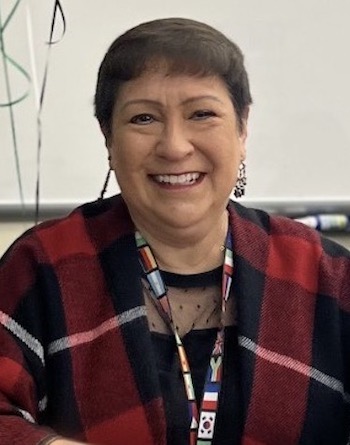Christina G. Espinosa-Pieb
Christina G. Espinosa-Pieb has shown a commitment to diversity, equity and student success throughout a career that has spanned more than four decades at De Anza College.
 As vice president of instruction from 2008-2023, Espinosa-Pieb led the college’s academic divisions, which educate about 18,000 students each fall. She played a central role in the hiring
and evaluation of faculty members, and has been a strong voice for equity and diversity in hiring throughout her career at De Anza.
As vice president of instruction from 2008-2023, Espinosa-Pieb led the college’s academic divisions, which educate about 18,000 students each fall. She played a central role in the hiring
and evaluation of faculty members, and has been a strong voice for equity and diversity in hiring throughout her career at De Anza.
The vice president of instruction oversees an annual budget of $80 million and represents the college in negotiations with the Faculty Association. Espinosa-Pieb also led the college’s enrollment management efforts and participated in many shared governance activities.
A first-generation college student herself, Espinosa-Pieb initially came to De Anza College as a community volunteer, working with disabled students. She was hired a few months later, in 1980, as a student employee of the Foothill-De Anza Community College District.
Over the next 18 years she worked in a variety of increasingly responsible positions – including administrative assistant, lead affirmative action representative, and coordinator of the Disabled Student Services Program – before becoming dean of academic services in 1999. In the dean’s position she oversaw offices devoted to diversity and staff development, managed Learning in Communities (LinC) and Honors programs, led the tenure review process, and acted as the college’s accreditation liaison officer.
During a leadership transition in 2003-04, she served as interim vice president of Instruction before resuming her work as dean. She was selected for the permanent vice president of Instruction position in 2008. During another transition, from 2018-2020, she served as interim president of the college, before returning to the vice president's office.
"Christina's work ethic, sense of fairness, commitment to De Anza's core values, community engagement, and unwavering advocacy for student equity are just a few of the many characteristics that position her to lead De Anza successfully through challenging times to an even higher level of educational quality," said Judy C. Miner, former chancellor of the Foothill-De Anza Community College District, when she selected Espinosa-Pieb for her first stint as interim president in 2018.
Espinosa-Pieb’s story is one of determination, hard work and a desire to help others realize their potential and succeed. She learned about the benefits of a De Anza College education firsthand by taking classes at night while working full time, ultimately leading to her career in higher education.
Her initial goal in taking classes was to become a secretary in the college’s Disabled Student Services Program. By the time she accomplished that goal, she’d become a devoted lifelong learner. She went on to earn a bachelor’s of science degree in business administration from the University of Phoenix, then a master’s degree in international and multicultural education from the University of San Francisco, both while working full time. She has completed all but her dissertation in Walden University’s doctorate program in community college leadership.
Informed by the variety of positions she has held at De Anza, Espinosa-Pieb has been a strong advocate for the integration of instruction and student services to support student success and retention. For several years she also taught a course at the college, titled "Women of Color in the U.S.A."
Espinosa-Pieb grew up in Corning, a small town near Chico, California, with her parents and seven siblings in a three-bedroom, one-bath home. In these circumstances, she said, “communication and respect for others was an absolute necessity each day.” As child number six, Espinosa-Pieb attributes her people skills, strong work ethic and love of multitasking to her upbringing.
She and her husband are longtime residents of Cupertino, where she is a member of the Rotary Club. Their two children graduated from De Anza College and transferred to the University of Southern California and the University of California, Berkeley.

